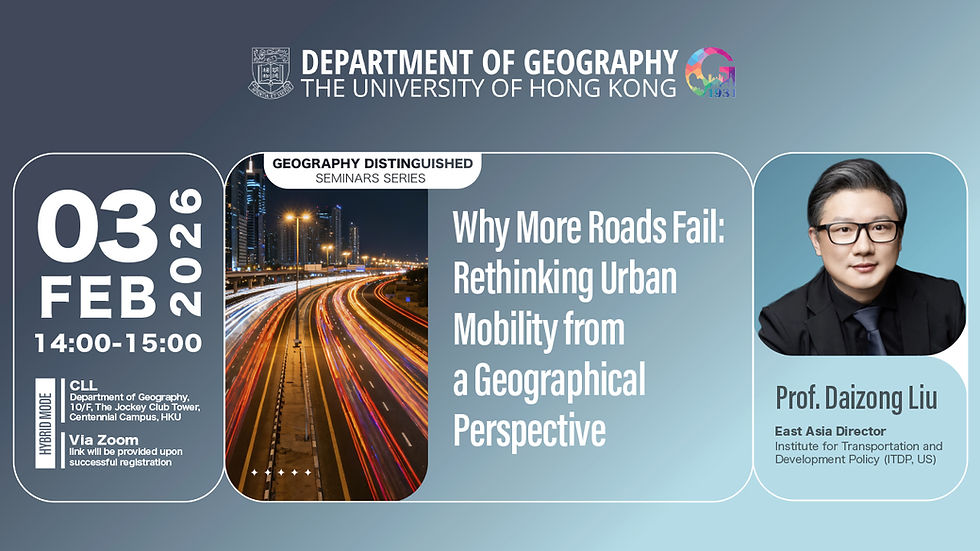13 NOV 2025 (THU) 14:00-15:00
- Nov 13, 2025
- 2 min read
Updated: Dec 17, 2025
Geography Distinguished Seminars Series
From Satellites to Solutions: How AI and Geoinformatics are Building Climate Resilience
Date: 13 NOV 2025 (Thursday)
Time: 14:00-15:00 (HKT)
Venue: Chamber, Faculty of Social Sciences, 11/F, The Jockey Club Tower, Centennial Campus, HKU
Mode: Hybrid
Via Zoom: Zoom link will be provided upon successful registration
Registration link: https://hkuems1.hku.hk/hkuems/ec_hdetail.aspx?guest=Y&ueid=103686
Abstract:
The convergence of Earth Observation and Artificial Intelligence is fundamentally reshaping our ability to understand and respond to the climate crisis. While satellites provide a massive, global stream of data on environmental change, the critical challenge lies in translating this information into actionable intelligence for decision-makers. This talk explores how the powerful synergy between AI and Geoinformatics is meeting this challenge, moving beyond mere monitoring to deliver practical solutions for climate resilience. We present examples of how AI are unlocking new value from satellite data, enabling the detection of subtle environmental shifts, the prediction of extreme weather impacts, and the precise monitoring of stored water changes. Crucially, we will highlight how these technologies could be operationalized on the ground—powering early-warning systems for disasters and guiding sustainable resource management. Finally, we will address the path forward: how can we ensure these powerful tools are accessible and interoperable to empower policymakers, local communities, and businesses alike. This integration is not just advancing science; it is providing the essential evidence base to build a more resilient and sustainable future.
Professor Joseph Awange
Professor of Environmental Geoinformatics, The Hong Kong Polytechnic University
Consistently ranked among the world's top 2% most-cited scientists since 2020 (Stanford), Joseph AWANGE is a Professor of Environmental Geoinformatics at The Hong Kong Polytechnic University's LSGI Department, having previously worked at Curtin University, Australia.
Prof. AWANGE began his academic journey with BSc and MSc degrees in Surveying from the University of Nairobi, Kenya. His exceptional promise was recognized through a DAAD merit scholarship, enabling him to earn a second MSc and a PhD in Geodesy at Stuttgart University, Germany, under the supervision of the late, world-renowned Prof. Erik W. Grafarend. His postdoctoral training was completed at Kyoto University (Japan) under the prestigious Japanese Society for the Promotion of Science (JSPS) Fellowship.
His distinguished research career has been honoured with several international awards, including multiple Alexander von Humboldt Fellowships, a 2015 JSPS Fellowship, and recognition from the Brazil Frontier of Science. Beyond his research, Prof. AWANGE holds a Postgraduate Diploma in Environmental Impact Assessment from Murdoch University, Australia. He actively contributes to the global scientific community as the Acquisition Manager for Earth Sciences, Geography, and Environment at Springer Nature, and as an Associate Editor for the top-ranked journal Remote Sensing of Environment and Science of Remote Sensing. His scholarly output includes more than 26 books and over 260 high-impact journal articles, and he has cultivated the next generation of scientists by mentoring more than 50 BSc (Honours), MSc, PhD, and postdoctoral researchers globally.










Comments